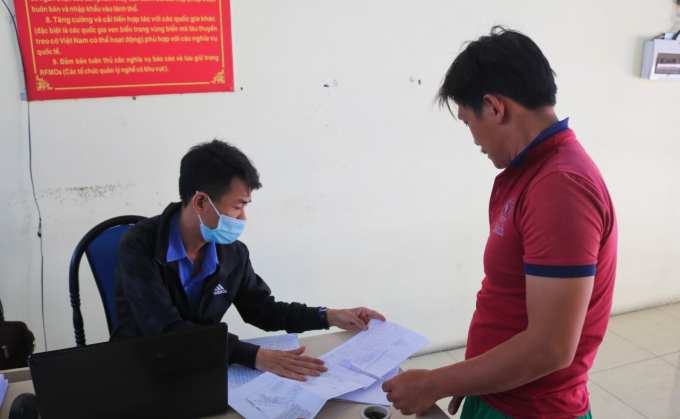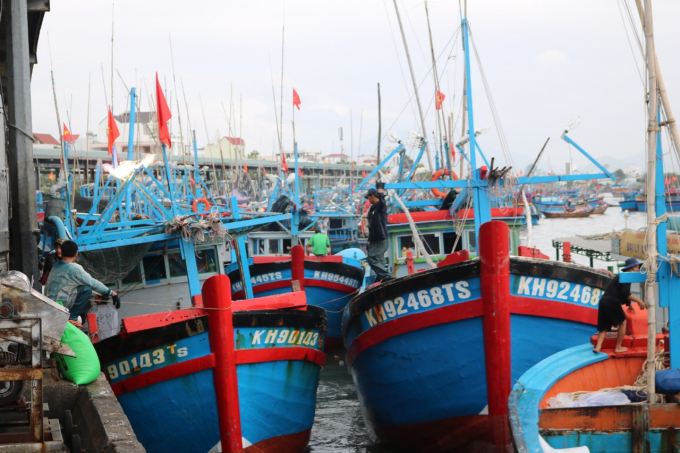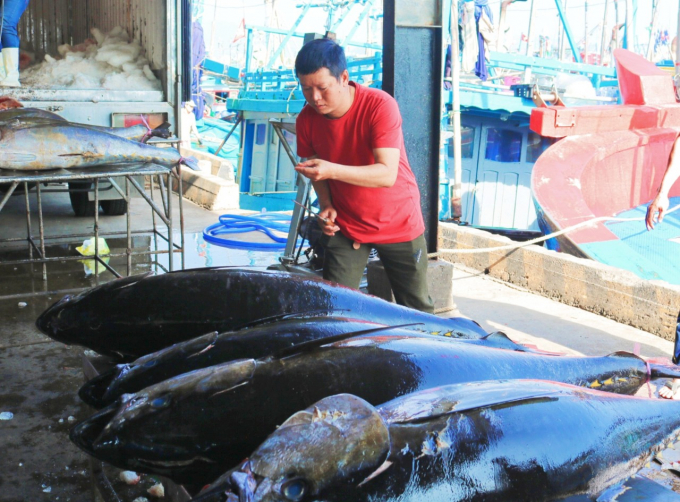May 24, 2025 | 22:12 GMT +7
May 24, 2025 | 22:12 GMT +7
Hotline: 0913.378.918
May 24, 2025 | 22:12 GMT +7
Hotline: 0913.378.918
Many offshore fishing boats such as tuna fishing and gill nets in Khanh Hoa returned to Hon Ro port, Phuoc Dong commune, Nha Trang city in the opening days of June after almost 20 days clinging to the sea.

Shipowners are now strictly implementing fishing logs after fishing trips to help remove the yellow card. Photo: KS.
According to our records, to comply with legal requirements and the EC's guidelines, vessel owners or captains must report to relevant authorities one hour before the scheduled arrival time for inspection.
Mai Thanh Phuc, Chairman of the Phuoc Dong commune's Fisheries Union, said that the province's offshore fishermen had always adhered to the declaration while departing and docking. Additionally, 32 of the union's fishing vessels have cruise monitoring technology. Each ship that goes out to sea, in particular, is dedicated to not violating foreign seas.

Fishing vessels in Vietnamese waters are brought into the port. Photo: KS.
Vo Khac En, Deputy Director of Khanh Hoa Fisheries Sub-Department, acknowledged the efforts of fishermen in the province in adhering to the law's requirements, particularly in eliminating the EC's "yellow card" since no fishing boats have violated foreign seas since 2018.
Additionally, fishing boats adhered closely to the declaration while departing and docking from the port. The inspection and traceability of aquatic goods utilized in the region have been brought under control and are now rigorously regulated...

Offshore fishing vessels in Khanh Hoa and Phu Yen have not violated foreign waters for many years. Photo: KS.
Nguyen Tri Phuong, Deputy Director of the Phu Yen Department of Agriculture and Rural Development, said that the province has been focusing on extreme measures to fight IUU fishing. To prevent and put an end to the situation of fishing vessels engaging in illegal fishing in foreign waters, the province has closely inspected, controlled, and supervised fishing vessels right at the fishing port, and has required captains to sign a commitment not to engage in illegal fishing in foreign waters.
Additionally, when fishing boats are at sea, they are carefully watched and regulated by competent authorities through the fishing vessel monitoring system. From there, immediately inform ship owners and captains of fishing boats that exhibit indications of crossing the border or exceeding the allowed limit for sea-based exploitation, immediately returning the ship to Vietnamese seas.
Additionally, a list of fishing boats at high risk of violating IUU fishing has been created to be shared with the Border Guard and local authorities to coordinate propaganda, recall, monitor, and oversee fishing vessels regularly to avoid violating foreign seas. As a consequence, no fishing boats have violated international seas in Phu Yen province from 2019 until the present.
Apart from the positive outcomes, implementing anti-IUU regulations still presents significant difficulties and limitations.

Currently, several ships in Khanh Hoa and Phu Yen have not yet installed cruise monitoring equipment due to loss of business and lying onshore. Photo: KS.
According to the Khanh Hoa Department of Agriculture and Rural Development, the province has 744 fishing boats with a length of 15 meters or more, of which seven are exempt from installing cruise monitoring systems due to the lack of main engines and being unsuitable for offshore operation. By June 2021, the province had placed cruise monitoring equipment on just 657 ships, an increase of 89.1 percent.
The remaining vessels in Khanh Hoa are not equipped with the VMS because some boats have been unable to maximize performance in the past, resulting in losses, many problems for fishermen, and inadequate money to buy equipment. Several additional fishing boats have ceased operations and are resting on the beach or awaiting transfer.
Additionally, since patrolling and prosecuting fishing offenses under IUU continues to be restricted, management and monitoring of fishing vessel operations confront many challenges. The reason for this is because the local fisheries surveillance force under the Khanh Hoa Fisheries Sub-Department has not been formed and consolidated, and therefore lacks a legal foundation for operation and enforcement.

Checking the quality of tuna at Hon Ro fishing port, Nha Trang city. Photo: KS.
Certifying raw fishery exploitation also presents challenges. Because some provinces outside the country have not fully updated their data on the national fishery data system.
Confronted with the aforementioned difficulties and problems, the Khanh Hoa Department of Agriculture and Rural Development proposed to the Central Government to increase patrols direction in adjacent waters to quickly assist fishing vessels in distress when operating in remote waters.
Early talks with key nations about the delimitation of Vietnam's maritime borders to improve management of fishing operations at sea, thus avoiding and mitigating the situation of Vietnamese fishermen and fishing boats breaching foreign seas for illegal fishing.
Simultaneously, coordinate and direct the units responsible for certifying extracted aquatic resources to ensure compliance with requirements.

(VAN) The People's Committee of Tra Vinh province has approved an adjustment to the investment policy for the Green Hydrogen Plant project, increasing its area to approximately 52.76 hectares.
![Reducing emissions from rice fields: [2] Farmers’ commitment to the soil](https://t.ex-cdn.com/nongnghiepmoitruong.vn/608w/files/news/2025/05/05/dsc08881jpg-nongnghiep-140632.jpg)
(VAN) Clean rice cultivation model in Thuong Tan commune, Bac Tan Uyen district, is assisting local residents in achieving sustainable agriculture by substantially reducing costs, increasing productivity, and protecting the environment.

(VAN) At the conference to disseminate Resolution No. 68, AgriS introduced its digital agricultural ecosystem and reaffirmed its commitment to accompanying the Government in promoting private sector development and sustainable agriculture.

(VAN) 'Blue Ocean - Blue Foods' initiative is designed to restore marine ecosystems and establish sustainable livelihoods for local communities by cultivating a minimum of 1,000 hectares of cottonii seaweed in the first three years.
/2025/05/21/4642-3-112707_603.jpg)
(VAN) The V-SCOPE project has made direct contributions to three out of six pillars of the Comprehensive Strategic Partnership between Vietnam and Australia.

(VAN) Facing the threat of rabies spreading to the community, Gia Lai province urgently carries out measures to vaccinate dogs and cats on a large scale.

(VAN) Disease-free livestock farming not only protects livestock herds but also stabilizes production and livelihoods for many farmers in Tuyen Quang.